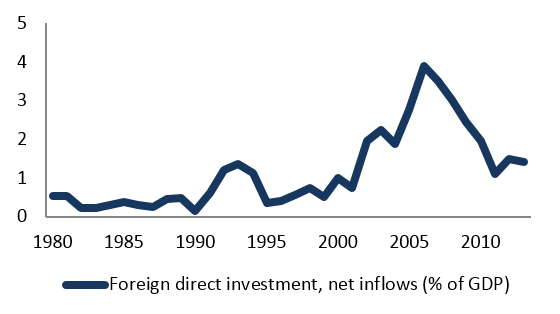MENA has always had low private investment both domestic and foreign. However, the political and economic unrests post the ‘Arab Spring’ raised the necessity of a dynamic and growing private sector than ever before. The dominant economic role of the public sector in MENA cannot endure, especially with the escalating unemployment rates, budget deficits, heavy dependence on food and manufactured imports, vulnerability to oil and foreign currency swings besides the challenging social and political environments.
FDI to MENA is fading away!

Approaches and results
International migration relaxes liquidity constraints of new enterprises and startups via providing stable financial resources in form of remittances and/or savings of returned migrants. Moreover, migrants brings in valuable human capital acquisition in form of work experience, skills, knowledge and contacts to undertake their own business or assist in successful implementation of existing projects and development initiatives in their home countries.
 The same political vulnerability mentioned earlier could provide an important driver of private investments and innovative entrepreneurs that favor new activities and eager to penetrate new markets. Waves of people leaving the region – driven by socioeconomic and political motivations – are escalating. Moreover, the recent implementation of nationalization employment policies (‘Nitiqat’ program) in Saudi Arabia – the largest employer of Arab expatriates – which seeks to increase the number of Saudi nationals employed in the private sector have raised the probability of repatriation for large number of existing diaspora that resulted in increasing their incentive to save their earnings and secure other sources of income in their home countries.The existing migration trend raises the importance of diaspora financial and human resources as a stable – compared to other sources of finance like FDI – catalyst for domestic private sector and entrepreneurship.
The same political vulnerability mentioned earlier could provide an important driver of private investments and innovative entrepreneurs that favor new activities and eager to penetrate new markets. Waves of people leaving the region – driven by socioeconomic and political motivations – are escalating. Moreover, the recent implementation of nationalization employment policies (‘Nitiqat’ program) in Saudi Arabia – the largest employer of Arab expatriates – which seeks to increase the number of Saudi nationals employed in the private sector have raised the probability of repatriation for large number of existing diaspora that resulted in increasing their incentive to save their earnings and secure other sources of income in their home countries.The existing migration trend raises the importance of diaspora financial and human resources as a stable – compared to other sources of finance like FDI – catalyst for domestic private sector and entrepreneurship.
Policy implications
The economic involvement of diaspora in their home countries requires effective designation and implementation of policies and programs. The following complementary four lines of action are proposed:
- Improving the regulatory framework of doing business and reducing bureaucratic hazards through reducing minimum capital requirements of starting new businesses and expanding the scope and quality of information and communications technology (ICT) applications and E- services
- Promoting investment usage of migrant’s financial and human resources via introducing new financial services, which targets expatriates outside the country. In parallel, new laws should be introduced to offer tax exemptions and reduced custom duties on business related imports of capital goods for migrants who decide to invest in their home countries. As well, initiating knowledge transfer programs to mobilize human capital dissemination by experts residing abroad and returnees, by giving courses and training programs in their areas of specialty to their domestic counterparts.
- Intensifying the migrant’s sense of belonging and increase their motivation to invest in their home countries via organizing regular initiatives and events for migrants abroad to sustain cultural, social, and political bridges. For instance, ensuring their participation in elections and representation in the parliament, as well highlighting their achievements in their areas of specialties in domestic media. Moreover, regularly advertise – via migrant’s postal or email address – any current or future national and development projects while providing flexible means of contact to answer any inquiries and facilitate their involvement.
- Encourage formally transmitted remittances, via building alliances between domestic and international banks. This would help in providing reliable figures for remittances entering the country. Also this would ensure the circulation of these foreign earnings in the financial sector and increase the assets base of banks.
Learn more about the paper here.


Join the Conversation